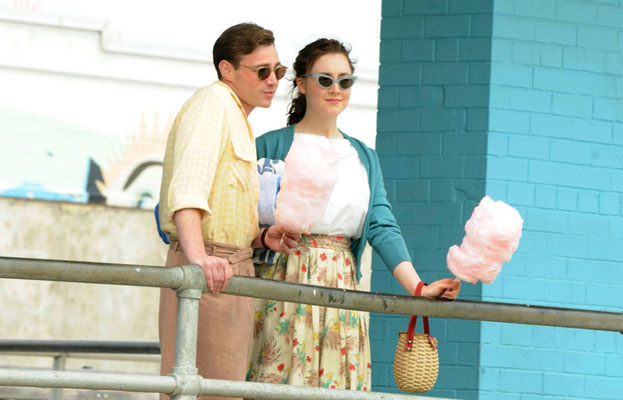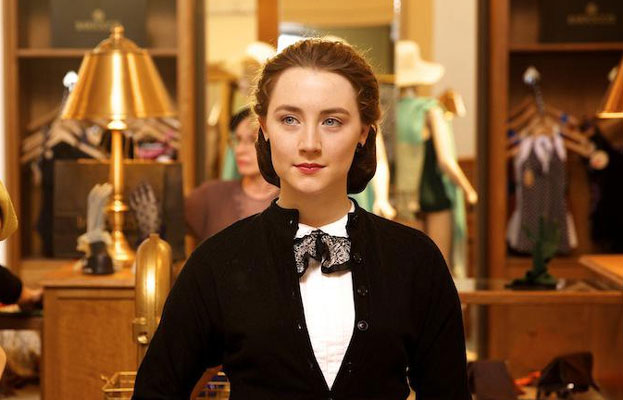The purity of love and the beguiling innocence of young lovers blossom in John Crowley's profoundly moving Brooklyn, a film that makes one believe in love again.
John Crowley's love letter to his homeland is a rare and treasured film. Brooklyn feels as timeless as the movies it celebrates, shedding new light on the tumultuous experience of an Irish immigrant in the 1950s. Somehow, the film is able simultaneously to feel like a sweeping epic and an artsy passion project.
Brooklyn follows Ellis Lacey (in a game-changing performance by Saoirse Ronan) as she leaves her family in search of a prosperous life in America. She moves into a boarding house full of other immigrants from the Emerald Isle, run by Madge Kehoe (played by a delightfully sassy Julie Walters). It isn't long before a dashing lad (Emory Cohen) sweeps her off her feet, but can their love withstand the strain of Ellis returning to Ireland?
Adapted from Colm Tóibín's New York Times best seller by Nick Hornby (An Education) and directed by John Crowley (Intermission, Boy A), Brooklyn stars Saoirse Ronan (The Grand Budapest Hotel and Atonement), Domhnall Gleeson (About Time, Anna Karenina), Emory Cohen (The Place Beyond The Pines), Jim Broadbent (Oscar winner for Iris) and Julie Walters (Billy Elliot and Educating Rita).
After acquiring the rights to Colm Tóibín's novel, producers Finola Dwyer and Amanda Posey tasked Nick Hornby with adapting the beautiful, yet understated prose of Tóibín's book.
A beautiful balancing act
For Hornby, the cinematic potential was obvious. "The way that Colm depicted the pain of wanting to be in two places at once, it's such a beautiful balancing act and it seemed to me to lend itself particularly well to film. If a young woman can identify with any of the characters in Pride and Prejudice she'd be able to identify with Brooklyn. At its heart there is a sort of timeless choice story between two different kinds of young men."
"It's not only the journey from Ireland to America, but it's the journey from just coming into womanhood to becoming the woman she wants to be," says producer Amanda Posey. "It's about a young woman finding her voice and finding her ability to choose, especially during a historical time when a lot of choices were restricted."
Achieving a balance between an engaging character study and social commentary on a part of Irish-American history needed a director who understood more than most the emotional pressures that Eilis and others like her must have felt.
John Crowley, an Irish native now living in England, first made his name as a director with 2003 Irish comedy Intermission and went on to direct BAFTA-winning drama Boy A.
Author Colm Tóibín saw the similarities in John and the character of Eilis. "John has been through that experience of being from an Irish place living under English skies and moving between the two places, so as soon as we started to talk about it, was something he understood."
Crowley was drawn to the universality of Eilis's experience, before Hornby had even written the script.
"I had read and loved the novel so I leapt at the chance to read the script. Nick's screenplay was, and still is, a really beautiful rendering of Colm's novel," says Crowley.
Fantastically emotional
"Colm's attempt to tell the story and his version of it is so brilliant, delicately constructed and so un-melodramatic, but so fantastically emotional. It's a deceptively simple book and upon reading it you could be forgiven for thinking 'I'm not sure there's a film in there, that it's not very dramatic', but actually, her choice between two countries and two men is about as dramatic as it gets."
Both were left in no doubt about Brooklyn's dramatic potential after reading Hornby's completed script; not least the author himself. "I was really amazed at the clarity of it; that he actually understood the central emotion was one about love, someone being torn between two possibilities," said Tóibín.
To Tóibín, Eilis's journey was not just one of emotional maturity; it was physical, too. "This is the secret history of two countries, of my country Ireland, that over the last 150 years every family has lost one or two members, people who left who never came back," he says. "So it's the secret history of Ireland, but it's also the secret history of the United States."
Hornby's understanding of the social mores of small-town Ireland in particular was immediately apparent to lead actress, Saoirse Ronan.
"The incredible thing about Nick is that he's not even from Ireland! Yet, he managed to completely capture the spirit of that country and the people from there. The script writing was so beautiful, and so beautifully subtle."
Economic migration
For Crowley, achieving a balance in the film between both journeys Eilis embarks upon was absolutely vital. "Vast numbers of people in the world do not live in the country that they were born in. A lot of it is economic migration and some of it is through personal choice. But equally, I think the story as Colm wrote it and then as Nick developed it and took it to a cinematic level with his screenplay, is completely relevant and truthful to that experience emotionally."
To draw such emotion out of his actors meant a very patient, hands-on approach for Crowley.
"I think in the book I was trying to build a character who wasn't self-conscious, didn't spend her time looking in the mirror and wasn't pushy, yet had beneath her a sort of depth of feeling - almost stubbornness at times."
So Colm Tóibín describes the lead protagonist of Brooklyn, Eilis.
Finding a lead actress to portray the subtleties and sensitivities of the character was central to the success of the story's translation to the big screen. That person was Saoirse Ronan.
Born in New York to Irish parents and raised outside Dublin, Saoirse first found fame in Joe Wright's Atonement, and went on to make starring roles in The Lovely Bones, Hanna, How I Live Now and most recently Wes Anderson's The Grand Budapest Hotel, all by the age of 20.
Immediate parallels
Ronan, like Crowley, was able to draw immediate parallels between Eilis's background and her own.
"I think it was very close to my heart because it was about my people. It was the journey that my parents went on back in the 1980s; they moved over to New York and they kind of went through all the same things, even though it was a different era and a different time.
I was lucky because I'm very Irish in some ways, but I do have an American kind of sensibility as well and I was born in New York," continues Ronan. "I think that made it even more emotional for me, because I had such a strong connection to both of these places and these people."
And the correlation between Saoirse and Eilis wasn't restricted to social and geographical circumstances. It was intensely personal, too.
"Everything that Eilis goes through was exactly what I was going though at that point in my life, and I'm still going through now. So emotionally, it was extremely close to where I was at in my own life."
As a consequence, Ronan found it increasingly hard to separate the emotions of her character from those of her own.
"I've always been able to separate myself at the end of the day, leave the story behind, just go home and be myself again, but there were times when I was on set and it was so realistic for me that it would remind me of something that's happened in my own life, and I would just start crying.
"The biggest hurdle that you go through in your life is leaving the security of your family and your friends and the place that you've grown up in."
John Crowley saw Saoirse's ability to sympathise with Eilis as an incredibly important element in translating the emotion of the novel to the big screen.
"It's the part that Saoirse seems to have been waiting for. There's an intersection there between the actor and the role which happens, I think. If you're lucky, it happens once in your career and every word that that Saoirse spoke on set she could have just been making up off the top of her head.
Emotional depth
"The performance has an immediacy to it and emotional depth that is astonishing. You can't detach her from that role in any way. It's completely hers."
Just as important to the translation of the story from book to screen was the casting of Tony Fiorello and Jim Farrell, two equal temptations to Eilis on opposite sides of the Atlantic.
Emory Cohen, born and raised in New York City, was a natural choice for the part of Brooklynite Tony. Though, having made his name playing more troubled characters in NBC's Smash and Derek Cianfrance's The Place Beyond The Pines, the move towards a mild-mannered, affectionate young man was a step in a different direction for Cohen.
"I have always thought about the film in regard to young love. What does it mean to be a good man? What does it mean to love wholeheartedly? What does it mean to enjoy the simple things? Things that I never had to answer in dark movies where I would end up punching people!"
For the director, the hope in creating Brooklyn is that the audience are emotionally invested and really care about the decision she makes, regardless whether they think it's the right one.
"I'd like people to be moved primarily by the story," says Crowley. "I think that it's sort of the strongest aspect, actually; it quietly creeps up on you for a story which is ostensibly undramatic."
Brooklyn is screened from 13 November.
For more information on the latest film releases, go to www.writingstudio.co.za














































